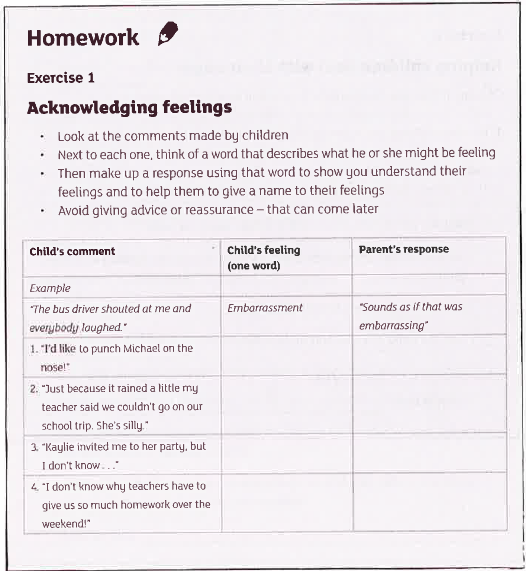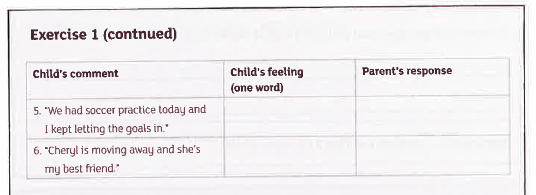Loading Content...
Share a Link to this Message
The link has been copied to your clipboard; paste it anywhere you would like to share it.
CloseParenting Teens - September 4, 2012
Day 19 - Effective Communications Strategies Part I

We look at the role of listening and attention-giving in effective communications.
2. Learn to listen
• treat them like young adults (not children)
• Listen carefully to their views and feelings
Effective communication requires that parents
o learn to speak with their teenager rather than at their teenager (Gary Chapman, The Five Love Languages of Teenagers)
o engage in discussion and be prepared to debate the issues rather than repeating Simplistic slogans such as “You're too young to have a boyfriend” or “drugs are dangerous”
3. Give your full attention
• recognize the important moments to listen and give your full attention
• don't try to listen to your teenager while doing something else at the same time
• maintain eye contact; observe your teenager’s body language
Question:
When have you had your best conversations with your teenager?
From Series: Parenting Teenagers | More Messages from Parenting Teens | Download Audio
From Series: "Parenting Teenagers"
More Messages Associated With "Family"...
| Day 1 - Introduction | August 13, 2012 | Watch | Listen | ||
| Day 2 - Challenges | August 14, 2012 | Watch | Listen | ||
| Day 3 – Family Provides Support | August 15, 2012 | Watch | Listen | ||
| Day 4 – Family Provides Fun & A Moral Compass | August 16, 2012 | Watch | Listen | ||
| Day 1 - Introduction | August 17, 2012 | Watch | Listen | ||
| Day 5 – Experiencing & Observing Healthy Relationships | August 17, 2012 | Watch | Listen | ||
| Day 2 - Making Adjustments | August 18, 2012 | Watch | Listen | ||
| Day 6 – Practicing Healthy Relationships (and Parenting Alone) | August 18, 2012 | Watch | Listen | ||
| Day 3 - Making Adjustments Part II | August 19, 2012 | Watch | Listen | ||
| Day 7 – Setting Goals and The Importance of Play | August 19, 2012 | Watch | Listen | ||
| Day 4 - Understanding the Pressures | August 20, 2012 | Watch | Listen | ||
| Day 8 – Screentime | August 20, 2012 | Watch | Listen | ||
| Day 4 - The Third and Fourth Seasons of Marriage - Autumn and Winter | Marriage Course | August 20, 2012 | Watch | Listen | |
| Day 5 - Remembering our Long Term Aim | August 21, 2012 | Watch | Listen | ||
| Day 9 – The Importance of Bonding | August 21, 2012 | Watch | Listen | ||
| Day 6 - Home - A Place of Safety and Acceptance | August 22, 2012 | Watch | Listen | ||
| Day 10 – The Importance of Establishing Routines | August 22, 2012 | Watch | Listen | ||
| Day 7 - Home - A Place to Learn Good Values | August 23, 2012 | Watch | Listen | ||
| Day 11 – Bedtimes | Parenting Children | August 23, 2012 | Watch | Listen | |
| Day 8 - Home - A Place of Fun | August 24, 2012 | Watch | Listen | ||
| Day 12 – Introduction to the Love Languages | August 24, 2012 | Watch | Listen | ||
| Day 8 - Nurture Each Other | Marriage Course | August 24, 2012 | Watch | Listen | |
| Day 13 – Introduction to the Love Languages II | Parenting Children | August 25, 2012 | Watch | Listen | |
| Day 9 - The Art of Communication | Marriage Course | August 25, 2012 | Watch | Listen | |
| Day 9 - Home - A Place to Learn Good Relationships | August 25, 2012 | Watch | Listen | ||
| Day 14 – Love Language – Affirming Words | Parenting Children | August 26, 2012 | Watch | Listen | |
| Day 10 - Effective Communication | Marriage Course | August 26, 2012 | Watch | Listen | |
| Day 10 - Family and Meal Times | August 26, 2012 | Watch | Listen | ||
| Day 15 – Love Language – Affectionate and Appropriate Touch | Parenting Children | August 27, 2012 | Watch | Listen | |
| Day 11 - The importance of listening | Marriage Course | August 27, 2012 | Watch | Listen | |
| Day 11 - Love Languages | Parenting Teens | August 27, 2012 | Watch | Listen | |
| Day 16 – Love Language – One to One Time | August 28, 2012 | Watch | Listen | ||
| Day 12 - Love Language - One to One Time | Parenting Teens | August 28, 2012 | Watch | Listen | |
| Day 17 – Love Language – Thoughtful Presents | Parenting Children | August 29, 2012 | Watch | Listen | |
| Day 12 - Hindrances to Listening - Filters | Marriage Course | August 29, 2012 | Watch | Listen | |
| Day 13 - Love Language - Affirming Words | Parenting Teens | August 29, 2012 | Watch | Listen | |
| Day 18 – Love Language – Kind Actions | Parenting Children | August 30, 2012 | Watch | Listen | |
| Day 14 - Love Language - Affectionate Touch | Parenting Teens | August 30, 2012 | Watch | Listen | |
| Day 15 - Love Language - Thoughtful Presents | Parenting Teens | August 31, 2012 | Watch | Listen | |
| Day 19 – Summary of the Love Languages | Parenting Children | September 1, 2012 | Watch | Listen | |
| Day 16 - Love Language - Kind Actions | Parenting Teens | September 1, 2012 | Watch | Listen | |
| Day 17 - Effective Communications | Parenting Teens | September 2, 2012 | Watch | Listen | |
| Day 18 - Engaging in Dialogue | Parenting Teens | September 3, 2012 | Watch | Listen | |
| Day 20 - Combining Love and Limits - Why Boundaries Matter | Parenting Children | September 3, 2012 | Watch | Listen | |
| Day 19 - Effective Communications Strategies Part I | Parenting Teens | September 4, 2012 | Watch | Listen | |
| Day 21 - The Challenges of Setting Boundaries | Parenting Children | September 4, 2012 | Watch | Listen | |
| Day 20 - Effective Communications Strategies Part II | Parenting Teens | September 5, 2012 | Watch | Listen | |
| Day 22 - Where do we set boundaries | Parenting Children | September 5, 2012 | Watch | Listen | |
| Day 21 - Effective Communications Strategies Part III | Parenting Teens | September 6, 2012 | Watch | Listen | |
| Day 23 - Setting Boundaries Part I | Parenting Children | September 6, 2012 | Watch | Listen | |
| Day 24 - Setting Boundaries Part II | Parenting Children | September 7, 2012 | Watch | Listen | |
| Day 25 - Helping Children Make Good Choices Part I | Parenting Children | September 8, 2012 | Watch | Listen | |
| Day 26 - Helping Children Make Good Choices Part II | Parenting Children | September 9, 2012 | Watch | Listen | |
| Day 27 - Helping Children Make Good Choices Part III | Parenting Children | September 10, 2012 | Watch | Listen | |
| Day 28 - Helping Children Make Good Choices Part IV | Parenting Children | September 11, 2012 | Watch | Listen | |
| Day 29 - Modeling and Practicing Relationships - The Power of Listening | Parenting Children | September 12, 2012 | Watch | Listen | |
| Day 30 - The Power of Listening - Part I | Parenting Children | September 13, 2012 | Watch | Listen | |
| Day 31 - The Power of Listening - Part II | Parenting Children | September 14, 2012 | Watch | Listen | |
| Day 32 - Relationships with siblings and other children Part I | Parenting Children | September 15, 2012 | Watch | Listen | |
| Day 33 - Relationships with siblings and other children Part II | Parenting Children | September 16, 2012 | Watch | Listen | |
| Day 34 - Relationships with siblings and other children Part III | Parenting Children | September 17, 2012 | Watch | Listen | |
| Day 35 - Handling anger - Ours and theirs | Parenting Children | September 18, 2012 | Watch | Listen | |
| Day 36 - Helping our children manage their anger - Toddler tantrums | Parenting Children | September 19, 2012 | Watch | Listen | |
| Day 37 - Helping our children manage their anger - Older children Ages 5-10 | Parenting Children | September 20, 2012 | Watch | Listen | |
| Day 38 - Teaching our children to manage their anger | Parenting Children | September 21, 2012 | Watch | Listen | |
| Day 39 - Teaching our children to manage their anger Part II | Parenting Children | September 22, 2012 | Watch | Listen | |
| Day 40 - Encouraging Responsibility | Parenting Children | September 23, 2012 | Watch | Listen | |
| Day 41 - Symptoms of Unhealthy Control | Parenting Children | September 24, 2012 | Watch | Listen | |
| Day 42 - Good Choices - Sex | Parenting Children | September 25, 2012 | Watch | Listen | |
| Day 43 - Good Choices - The Internet, Games, Drugs and Alcohol | Parenting Children | September 26, 2012 | Watch | Listen | |
| Day 44 - Passing on Beliefs and Values - Answering Questions | Parenting Children | September 27, 2012 | Listen | ||
| Day 45 - Passing on Beliefs and Values At Home, With Others and On Money | Parenting Children | September 28, 2012 | Watch | Listen | |
| Day 46 - Praying for our children | Parenting Children | September 29, 2012 | Watch | Listen | |
| Day 47 - Developing family traditions, routines, and rituals | Parenting Children | September 30, 2012 | Watch | Listen | |
| Day 48 - Conclusion | Parenting Children | October 1, 2012 | Watch | Listen |
Powered by Series Engine

Show an interest
- involves effort and generosity
- listen to what appeals to your child(ren)
Avoid shutting them down
- value their ideas
- allow them to express negative feelings such as disappointments, embarrassments, sadness, anxiety, and anger.
Reflect back
- repeat back to your child what you think he or she is saying
- reflect back to your child some of his or her words, but not in parrot fashion, as that can be annoying
- concentrate on reflecting back the feelings you think your child is trying to express, e.g. it sounds like you feel upset or frustrated or sad?
- reflective listening will help your child(ren) to frame their own feelings

Complete the attached worksheet.


2157


